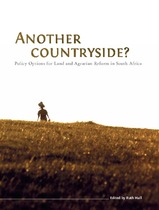Another countryside? Policy options for land and agrarian reform in South Africa

Date
2009Author
Aliber, Michael
Andrews, Mercia
Baiphethi, Mompati
Cliffe, Lionel
Hall, Ruth
Jacobs, Peter
Jara, Mazibuko
Kleinbooi, Karin
Lahiff, Edward
Zamchiya, Phillan
Metadata
Show full item recordAbstract
Land reform in South Africa is a political project that has foundered. For years, the process has been
variously described as being ‘in crisis’, ‘at a crossroads’, ‘at an impasse’ or simply ’stuck’. This still
seems as true as ever, as political pressure is mounting to find new solutions to old problems. In
recent years, the issue of ‘delivery’, and how to speed it up, has taken centre stage and become a
justificatory framework for arguments about how to reconfigure roles of the state and private sector in
land reform. In the process, little attention has been given to the relationship between policy change
and mobilisation from below. In the absence of sustained and organised pressure from rural people
themselves, it appears that the shifts underway in land reform policy are not so much about ‘delivery’
as about reframing the entire project. Increasingly, the debates on land reform centre not so much on
the mechanisms to be used, as on the vision that is to be pursued – something about which existing
policy is remarkably silent. At stake is nothing less than what, and whom, land reform is for. South
Africans are deeply divided on this question.
